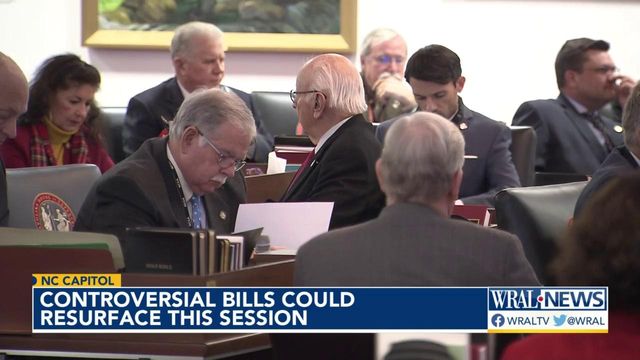Medical marijuana, race education and guns: NC lawmakers to reconsider controversial bills
The North Carolina General Assembly returned to Raleigh on Wednesday after a two-week January break. Some controversial bills from recent sessions are likely to resurface on this year's agenda, thanks to a shift in the partisan balance of the House and Senate.
Posted — UpdatedDuring the past four years, Gov. Roy Cooper, a Democrat, has vetoed 47 bills. In those years, Democratic lawmakers held enough seats to block Republicans from overriding those vetoes. Now that Republicans have gained enough seats for a veto-proof majority in the Senate, and are only one seat short in the House, GOP leaders say they're likely to bring some of those ideas back for another try.
This year, Senate Leader Phil Berger said he expects it will pass his chamber again. Speaker Tim Moore said it may have better chances this time in the state House. “There is some support for something where there’s doctors involved and where there’s tight controls and pharmaceutical involvement,” Moore said.
“We’re here to represent our constituents,” Berger said. “So I think it's important for us to understand where the people of the state of North Carolina are … as we're going through the process of trying to figure out what the policy in North Carolina ought to be.”
House and Senate Democrats scheduled a Thursday news conference to promote their own legislation filed Wednesday that would codify previous Supreme Court standards on abortion access stemming from the 1973 Roe v. Wade decision that was overturned. House Speaker Tim Moore said Wednesday the bill is unlikely to get a hearing in the GOP-controlled General Assembly.
Resurrecting vetoed bills
One of the first bills filed in the House on Wednesday would require sheriffs to cooperate with immigration and customs enforcement by holding criminal suspects even after a person has posted bond, and allowing agents to come into county jails. It’s already been passed and vetoed twice in the past four years.
Moore said to expect a repeat of bills to loosen or repeal laws limiting who can carry concealed weapons and where they can be carried.
“Probably the pistol permit,” Moore said. “The legislation allowing guns to be used for protection … in church schools.”
Other vetoed measures considered likely to reappear include bills to make rioting a felony, ban schools from teaching about systemic racism and require them to put all course materials online, and require teachers to tell parents if their student is questioning their gender identity.
"You could probably take those bills that we passed, where we came up short. I'd see no reason why we wouldn't take another run at it this time, particularly when we feel like we have the votes to override," Moore said.
The Speaker said the House and Senate will also likely redraw their state and federal voting districts again, this time without the nonpartisan rules imposed on them last year by the Democratic majority on the state Supreme Court.
"This new Supreme Court needs an opportunity to kind of take a look at this, and hopefully rectify what I think have been some bad, bad holdings by the previous Supreme Court," Moore said.
Related Topics
• Credits
Copyright 2024 by Capitol Broadcasting Company. All rights reserved. This material may not be published, broadcast, rewritten or redistributed.




